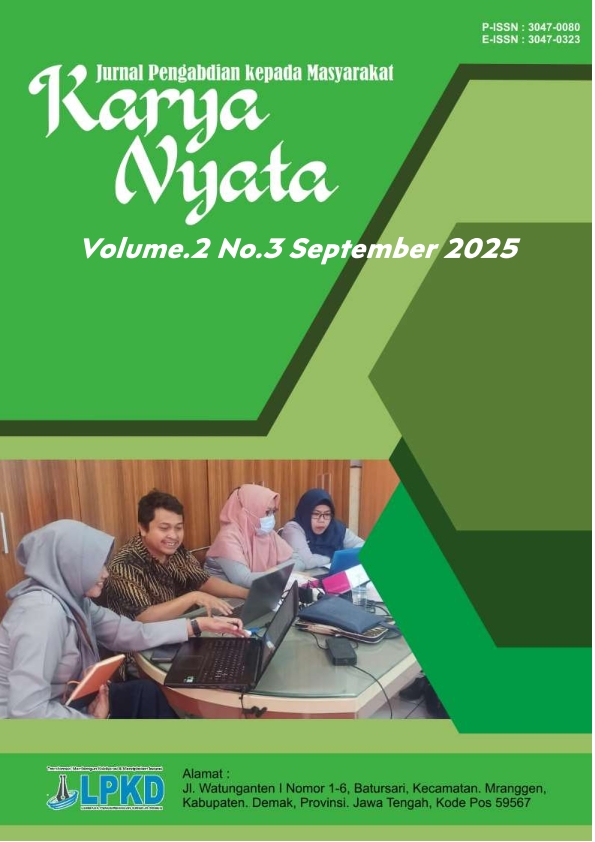Penyuluhan Pencegahan Gizi Buruk dalam Upaya Peningkatan Kualitas Kesehatan pada Peserta Didik
(Sekolah Dasar Negeri 101848 Desa Kuala Lau Bekeri Kecamatan Kutalimbaru)
DOI:
https://doi.org/10.62951/karyanyata.v2i3.2187Keywords:
Children, Education, Elementary School, Nutritional Balance, Personal HygieneAbstract
Personal hygiene and nutritional balance are very important for everyone to know, including children during their most critical growth period, to know. This Community Service Lecture (KKN) activity aims to increase the knowledge and awareness of students at Public Elementary School 101848, Kuala Lau Bekeri Village, Kutalimbaru District, regarding the prevention of malnutrition and self hygiene through educational counseling. The method used was a descriptive method with a qualitative approach, implemented through interactive lectures, presentation media, and question and answer sessions. The number of participants were 90 students from grades I to VI. And with the teachers support in maintaining regularity and reinforcing the educational presentation about the counseling material included the definition of nutrition and malnutrition, signs, causes, healthy eating patterns, and clean and healthy living behaviors. The results of the activity showed high enthusiasm from the participants in participating in the counseling and their ability to name examples of healthy foods and the importance of a healthy lifestyle. This counseling successfully increased participants' understanding of the importance of balanced nutrition and healthy living behaviors that play a role in supporting the optimal growth and development of school-age children. The involvement of teachers and schools greatly supported the success of this activity. It is hoped that this counseling can form positive habits in maintaining students' nutrition and health in a sustainable manner.
References
Beal, T., Tumilowicz, A., Sutrisna, A., Izwardy, D., & Neufeld, L. M. (2018). A review of child stunting determinants in Indonesia. Maternal & Child Nutrition, 14(4), e12617. https://doi.org/10.1111/mcn.12617
Bhupathiraju, S. N., & Hu, F. (2023). Kekurangan gizi (Vol. 2023). Manual MSD. https://www.msdmanuals.com/id/home/gangguan-nutrisi/kekurangan-gizi/kekurangan-gizi
Black, R. E., Victora, C. G., Walker, S. P., Bhutta, Z. A., Christian, P., de Onis, M., … Uauy, R. (2013). Maternal and child undernutrition and overweight in low-income and middle-income countries. The Lancet, 382(9890), 427–451. https://doi.org/10.1016/S0140-6736(13)60937-X
Dai, D., Anasiru, M. A., Domili, I., Misnati, & Hadi, N. S. (2022). Gambaran status gizi pada anak sekolah dasar. Journal Health and Nutritions, 8(1), 1–14.
Haeril, H., Rahman, A., Ichsani, I., Zulfikar, M., & Husnul, D. (2023). PkM pola hidup sehat dan aktivitas fisik sebagai upaya penurunan angka dan pencegahan stunting pada anak. Jurnal Dharma Pendidikan dan Keolahragaan, 3(1), 14–21. https://doi.org/10.33369/dharmapendidikan.v3i1.27374
Herlianty, H., Ketut Sumidawati, N., & Bakue, T. (2024). The importance of eating healthy and nutritionally balanced food for elementary school children. Abdimas Polsaka, 3(1), 40–46. https://doi.org/10.35816/abdimaspolsaka.v3i1.66
Mulyani, S. (2022). Edukasi pangan jajanan aman pada siswa SDN 37 Pekanbaru. PITIMAS: Journal of Community Engagement in Health, 1(1), 15–18. https://doi.org/10.36929/pitimas.v1i1.429
Mutika, W. T., Doria, M., & Ambariani, A. (2020). Hubungan kebiasaan sarapan dengan status gizi siswa di SD Negeri Kedung Waringin 01. Jurnal Kesmas Untika Luwuk: Public Health Journal, 11(1), 1–6. https://doi.org/10.51888/phj.v11i1.18
Oktavia, S., Widajanti, L., & Aruben, R. (2019). Faktor-faktor yang berhubungan dengan status gizi buruk pada balita. Journal of Chemical Information and Modeling, 53(9), 1689–1699. https://media.neliti.com/media/publications/163271-ID-faktor-faktor-yang-berhubungan-dengan-st.pdf
Siregar, S. D., Nst, R. B., Siambaton, N. H. B., & Usiono, U. (2023). Gaya hidup bersih dan sehat di sekolah dasar. Jurnal Medika Nusantara, 2(1), 23–26. https://doi.org/10.59680/medika.v2i1.829
Tan, W., & Novendy, N. (2025). Penanganan kasus gizi buruk pada anak perempuan dengan pendekatan kedokteran keluarga di wilayah kerja Puskesmas Cikupa. Syntax Literate: Jurnal Ilmiah Indonesia, 10(4), 3612–3621. https://doi.org/10.36418/syntax-literate.v10i4.58192
UNICEF. (2021). The state of the world’s children 2021: On my mind – Promoting, protecting and caring for children’s mental health. UNICEF.
World Health Organization. (2020). Malnutrition. https://www.who.int/news-room/fact-sheets/detail/malnutrition
Downloads
Published
How to Cite
Issue
Section
License
Copyright (c) 2025 Karya Nyata : Jurnal Pengabdian kepada Masyarakat

This work is licensed under a Creative Commons Attribution-ShareAlike 4.0 International License.





